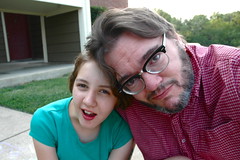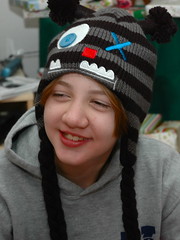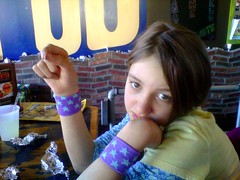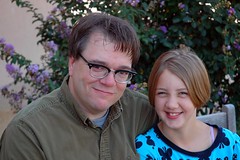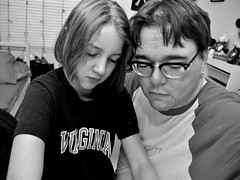"I lost ten pounds in the week since I was at the doctor. No joke. Perhaps I should let this infection linger a little longer."
The short version of backstory is that for the past week and a half, I have been sick. REALLY sick, actually, with a one-two punch of what the doctor wanted to call pneumonia but which I weaseled her down to bronchitis (because I am so very very charming, no doubt) and a wicked sinus infection. The bronchitis was under control fairly quickly, but the sinus infection, my very first, lingered painfully and disgustingly. I'm going to skip the details, but suffice to say that due to a near-constant nausea, I had very little to eat that week. When I returned to the doctor for new, hopefully not-pretend antibiotics, the nurse weighed me, and yep. I had lost exactly ten pounds in the course of a week.
So I posted that fun little status update. There are two parts to it, which I believe can be identified as a) the "silver lining" part, and b) the "obviously a joke" part.
Well, maybe not entirely obviously. Someone left what I felt was a passive-aggressive response, linking (without comment) to "How To Spot Fat Talk So You Can Stop It". When I called her on it, she took the "oh, I'm just saying…" approach, and that pushed my button, I guess. Don't walk in the room, release a flatus and then pretend it wasn't you. She said she found "fat talk" to be toxic, and I guess it didn't matter that I was talking about myself, and that no, I wasn't actually advocating the use of illness for radical weight loss.
Because here's the thing: I didn't make a choice. Getting a nasty infection wasn't part of my plan. I didn't stop taking my antibiotics or stick Cheetos up my nose. I was sick, it sucked a very great deal, and I didn't eat much. I didn't really understand how much weight I was losing because I wasn't changing out of my pajamas much. I was a delightful treat; if you had knocked on my door this week, when I answered the door, you wouldn't have thought "Sexy MAN!" You might have phoned up the Centers for Disease Control after you finished spraying Lysol in your face.
I'm going to be blunt. She seemed like a perfectly nice person, but I found her point to be extremely unconvincing, as was another comment by someone else later. Because, again, it was a joke, and again, it wasn't a joke at someone else's expense. You can't just show up on someone else's Facebook page and take their self-referencing, self-deprecating humor and sanctimoniously apply it to yourself. Well, you can, but I'm not sure why you would want to.
Anyway, the whole thing got a little out of hand. (Trust me, you want to read that. I'll wait.)
Fun Internet kookery aside, weight is a tricky issue to discuss publicly. I know that in the "fat-o-sphere" (I really did just type that), there are a lot of specific rules for how these discussions are supposed to take place, with lots of trigger warnings and the like. I know none of these rules, and I'm not sure I care to learn them. Not because I'm a dick (or not JUST because, if you prefer), but because the weight issues I'm discussing are my own. I'm not sure I need a set of guidelines to talk about me.
I've always had issues with weight, ever since I was a kid. And while I've never been morbidly obese, I can't remember the last time I was exactly fit, either. I'm going to use some actual numbers today, since I'm sitting at the low end at the moment. For scale, I am six foot, two inches tall and possess all my limbs and parts in the usual proportions.
At my worst, during what might be termed my "County Fair" days, I weighed 280 pounds. No joke. I remember that day, when I stepped on the scale and saw that number. I was young, too, maybe twenty-six or so. I spent the prime of my youth eating and (more to the point) drinking as if an alien invasion were imminent. All I got for my troubles was about ten years of photos I will never show anyone, and well, yeah, perhaps a little type 2 diabetes. (That was a joke, too. I come from a long line of genetic diabetics, although I certainly tossed enough gasoline on the fire.)
By the time I met Julie, I was way down from that, maybe 250 pounds. I lost a bunch of weight when I was diagnosed with The Beedies at 37, but then I published a book and ate and drank a lot and gained pretty much all of it back. The last time I really remember weighing myself was about a year ago, and I was at an unpleasant 245.
Now here's where it gets fun. Last week, when I went to the doctor, I was surprised to find that I weighed 223 pounds. I knew I had lost some weight; my clothes told me that. But twenty pounds, for nothing? I was pleased.
When I went back to the doctor exactly one week later? 213 pounds. That's not all that far from my doctor's target weight for me. The last time I weighed this little, I think I was still receiving lunch money.
For those of you who also have had weight issues during your life, however, you understand a kind of universal truth. Numbers don't always mean a whole lot to a fat person. Not good ones, anyway. And when I say "fat person", I mean that in the same way that someone who has been clean and sober for twenty years still self-identifies as an alcoholic. Sometimes you can tell the formerly fat person by the clothes they wear, at least a size too large, as if they don't trust what their own senses tell them in the dressing room. I imagine sometimes you can identify the formerly fat in the ranks of the extremely fit and healthy. They watch those numbers closely, perhaps a little grimly. Their own silent exercise mantra might be "Never again."
You can be the obscenely rich CEO of a major corporation, but you can still probably list the names of the bullies who made fun of you when you were a little fat kid. You can have the most beautiful and successful man or woman on your arm at an elegant dinner party, but if you close your eyes, you can clearly see the faces of the pretty girl or the handsome boy who turned you down in school with a barely-concealed smirk on their face, the universal "As if!" sneer.
And if you were a fat kid who discovered early on that you could make people laugh at the jokes you made instead of the shape of your body, then you made sure to hone those skills. You learned to make jokes, and not just innocent ones, either. You learned that the easiest way to deflate a bully was to get the crowd to laugh at him instead, so you developed a sense of humor with an edge, and you never forgot how to use it. And you never ever forgot that if you really wanted to be funny and to keep yourself in the good graces of others, you saved the most biting jokes for yourself.
And when someone shows up on your Facebook page to tell you to use nice words when you talk about weight issues, even when you're talking about yourself, you push back. And you should. Because no matter what your size now, you're a fat person. And you're not about to let someone who (in your mind) apparently hasn't figured out How Things Work take away your own best defenses simply because when they see "fat talk", they take it to heart, as if every conversation about fat people is a conversation about them. As if the warm embrace of "The Fat-o-sphere" is the only place one can find relief, with words of acceptance and maybe some denial, but never anything harsh or sad.
Some of us, and I'm going to say that includes a lot of you reading right now, some of us learned a different way. And whether we hide our fat person past or joke about it or sweat and bleed it away at the gym, we at the very least own our fat person in our own way. If you're a fat person and you try to change that, you might be a well-intentioned person, but you really ought to know better.
 |
| Yours truly at 213. Don't get too accustomed to it... |

